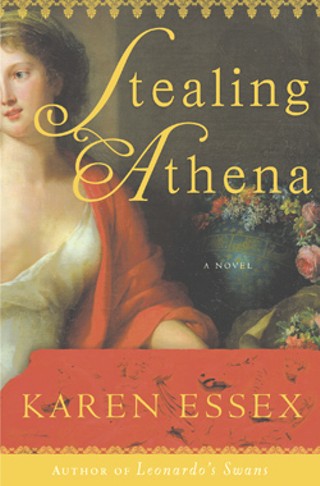Two galleries, thousands of miles apart, both built to hold a group of ancient Greek sculptures that are known as the Elgin Marbles.
One gallery is filled with ancient treasures. The other stands empty, despite an international outcry to return the marbles to their original home in Greece.
It sounds like a plot from a novel, but the struggle is real. The British Museum has held the marbles, which once comprised nearly half of the Parthenon, for more than 200 years after they were removed and shipped to England.
Bestselling author Karen Essex has woven a historical novel,
Stealing Athena, around the story of the Elgin Marbles. It tells the stories of two women - one who was present for the creation of the marbles, the other who was present for their deconstruction.
Essex was in Savannah recently to visit her friend, Rosemary Daniell, and to conduct a Zona Rosa writer’s workshop on Tybee Island. “Rosemary is an old friend of mine,” Essex says. “We were introduced by Bruce Feiler, who’s also a Savannah native who’s become a well-known writer.”
Essex’s own life could provide inspiration for a novel. A native of New Orleans, she’s had several successful careers that have taken her around the world.
“I left New Orleans right after graduation from Tulane,” Essex says. “I moved to Paris and was a model, then went to Los Angeles to pursue film production. I worked my way into an executive position and worked for Blake Edwards and several other production companies.”
Her own writing career began shortly after. “After I read several bad screenplays, I thought, ‘Surely I can do better than that,’” Essex says.
Since then, Essex has written and adapted several screenplays, including, most recently, a dance movie for Jennifer Lopez Entertainment and Paramount Pictures. She’s adapted her own novels, Kleopatra and Pharaoh, into a screenplay for Warner Bros. and has adapted Anne Rice’s novel The Mummy for Titanic director James Cameron. Her third novel, Leonardo’s Swans, about two sisters who posed for Leonardo Da Vinci, became an international bestseller.
The novels are historical epics that require extensive research. “I love it,” Essex says. “I can’t even explain why.”
Essex’s books are so detailed, some people have asked her if she believes she was Cleopatra in a previous life. “I might have been Julius Caesar, but I certainly wasn’t Cleopatra,” she laughs. “I’m really fascinated with the ancient world.”
Stealing Athena tells the story of Mary Elgin, the wife of Lord Elgin, who was responsible for taking the marbles to England. It also tells the story of Aspasia, mistress of Pericles.
“I decided to take this on as a book because, one, the poor Greeks have been trying to get the marbles back for 200 years, and, two, because I write about powerful women and history,” Essex says. “When I found out it was actually Lady Elgin with the money, brains, charisma and know-how to convince the sultan to allow Elgin to take those statues, I knew then it was a story for me to tell.”
Despite Lady Elgin’s attempts to help her husband, he later divorced her on charges of adultery, a scandal that resulted in tabloid coverage that lasted for months. She also was kept away from her children.
“It’s just heartbreaking the price that she paid,” Essex says. “I decided to write the book from the point of view of both women.”
Asphasia, too, paid a price. A philosopher, she had major influence on Pericles, which was deeply resented by others. She was indicted on charges of impiety and conspiring to draft women into prostitution, charges that were trumped-up.
“I think their stories resonate,” Essex says. “Women do pay a price for ambition. It’s always been a more treacherous world for us girls. The conversation of women’s place in society was going on in Asphasia’s day, and the same conversation is going on today.”
All women’s history is hidden history, Essex says. “If you pick up a textbook, you won’t find out very much about women. We’ve been basically dropped from the historical record. I don’t think it was a male conspiracy to do that. History traditionally is written about battles and conquest. Women were not a direct part of that, so women’s accomplishments went unsung.”
She says that without these women in their lives, men could not have accomplished “a fraction of what they accomplished.”
“People have been using female know-how and talent all along, they’re just not giving women credit.”
Essex first saw the Elgin Marbles in 2001. “At that time, I was still on the side of the English,” she says. “I thought they rescued the statues, cared for them, made them available to the world.
“But as the years have gone by, I’ve swung over to the Greeks,” Essex says. “They’ve built a fantastic new museum opposite the Acropolis, including a beautiful and dramatic gallery in anticipation of getting the marbles back.
“The museum will open for good in September, and I think there will be a tremendous outcry,” she says. “Even public opinion in Britain is swinging over to the Greek side. It’s time to return them to the people who basically gave us our way of life, and those are the Athenians.”

























